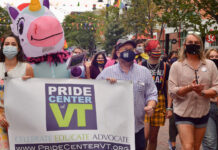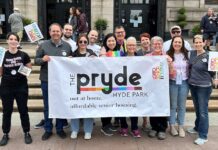A new report from The Fenway Institute and the Equality Fund at the Boston Foundation finds that the population identifying as lesbian, gay, bisexual, transgender or other sexual and gender minorities (SGM) in Massachusetts is growing and dispersed geographically across the Commonwealth.
However, data show notable disparities between SGM people and straight, cisgender adults in areas including health care, mental health, employment, and economic stability that require advocacy, progress and vigilance against potential threats.
The report, entitled LGBTQ+ People in Massachusetts: Strengths, Challenges and Opportunities in a Diverse Community, was released this morning at an event at the Boston Foundation. The report examines changes in LGBTQ+ demographics, health and wellness, employment, and economic well-being, building upon research first laid out in the 2018 report Equality and Equity: Advancing the LGBT Community in Massachusetts.
“While the data show the remarkable vibrancy, vitality, and growth of Massachusetts’ LGBTQ+ population, this report comes at a time when this vital part of the fabric of our Commonwealth is under ever greater attack,” said M. Lee Pelton, President and CEO of the Boston Foundation. “This report shines an important light on the many dimensions of the fight for equity that LGBTQ+ people and their allies must, and will, continue to make good on our promises for a truly equitable Commonwealth.”
The researchers used population-based surveys, including the Massachusetts Youth Risk Behavior Survey (YRBS), the Massachusetts Youth Health Survey (MYHS), and the Massachusetts Behavioral Risk Factor Surveillance System (BRFSS) survey, to compile demographic and other data. This data was complemented with online listening sessions and interviews to provide robust anecdotal and qualitative data on the lived experiences of SGM people across the state.
“We must acknowledge that true equality for LGBTQ+ people in the Commonwealth remains unfinished work—especially for those outside Greater Boston, and particularly for individuals who are Black, Indigenous, or people of color, older adults, and those facing economic insecurity,” said Jordina Shanks, CEO of Fenway Health.
—from an Equality Fund press release
For the complete report and more, click here.
Not a subscriber? Sign up today for a free subscription to Boston Spirit magazine, New England’s premier LGBT magazine. We will send you a copy of Boston Spirit 6 times per year and we never sell/rent our subscriber information. Click HERE to sign up.









